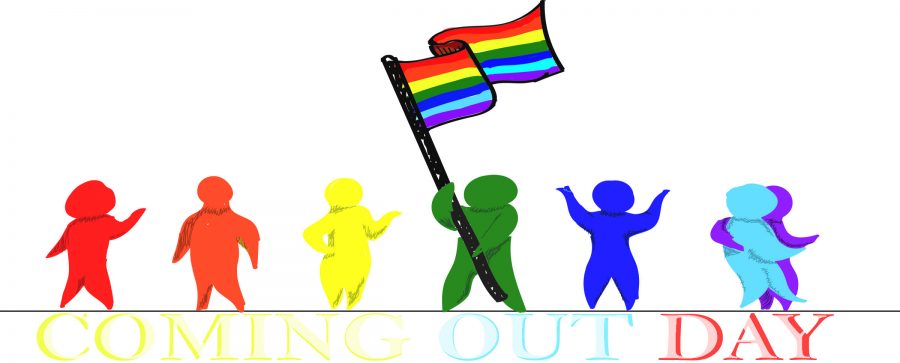Seven coming out tips for National Coming Out Day
On Oct. 11, National Coming Out Day was celebrated. A lot of people wonder why coming out is so important. Coming out to friends and family is one of the hardest parts in the lives of the lesbian, gay, bisexual and transgender community. When someone comes out they are putting their sexuality into the open hoping their friends and family will still accept them. Thankfully, many are accepted by their family and peers, but others aren’t so lucky. There are still people who don’t accept the LGBTQ+ community. In recent years, we as a nation have become more accepting, but coming out is still as tough and nerve racking as ever. The Exponent hopes that these tips will help members of the LGBTQ+ community, and also help others understand the courage it takes to come out.
Be willing to accept that some people won’t accept you.
The hardest part of coming out is accepting that there will be people who don’t accept you based on your sexuality. Homophobia is still a thing and many LGBTQ+ members will lose a close friend or relative after coming out. As sad as this is, it’s a reality that you must be willing to accept. Once you realize that someone doesn’t accept you for this small part of who you are, then you will be able to move on.
Start with close friends.
Once you are ready to come out, start by telling your close friends. Wait for a good moment and just say you have something that you need to tell them and simply say to them, “Hey, I’m…” There’s no need for an extravagant way of telling them. Be straight up and open about it, and they will most likely accept it. You may lose one or two friends, but in the long run you will be happier not having to hide your sexuality.
How to tell your family.
You should tell your family just like you told your friends just by being open and honest. A lot of the time they will say something like, “I’ve known for a while.” Some may have parents who are shocked, and you shouldn’t worry, just give them a little time to regain their composure and talk to them about it. A few may have family that refuse to believe it. This is a sad reality for many LGBTQ+ members and it will be hard to handle at first. Just remind yourself that it was something you needed to do and that you will be happier doing so. There’s a fair chance that your family will come back around and accept you, but that may take some time.
Surround yourself with supportive people!
Our campus alone offers the members of the LGBTQ+ community access to a variety of supportive groups such as, the Alliance, LGBTQ+ support group and The Doyle Center. The Alliance has already hosted multiple community events this year as well has actively celebrated days dedicated to the LGBTQ+ community.
Read how others have come out.
There are hundreds of stories online about how people came out. How they decided when the best time was, how they handled the adversity and more to help you. Hearing how it turned out for them can help take away your fear.
What about after coming out?
The most important thing to do after coming out is to just live your life. As simple as it sounds, you will feel more free than you did before. You’ll eventually make friends who are accepting or part of the LGBTQ+ community. Hopefully, you will be able to bring your significant other to meet the family or take them to see your closest friends knowing that they accept you for who you are.
What about the people who aren’t so accepting?
You will come across some people who give you a hard time about being queer. Your friends will be your allies and help stick up for you. If it’s at school, you should talk to someone immediately if it gets out of hand. All schools are legally obligated to ensure that you are treated fairly and most importantly ensure that you are safe. If you face harassment in the workplace you should do the same as they are legally obligated to make sure you are treated fairly.
Even in 2016, it is hard for LGBTQ+ members to come out even though we are becoming more accepting each year. National Coming Out Day is important because it gives closeted people hope that they can muster up the courage to come out. We can only hope that one day coming out will be easy and that everyone will be accepting.




